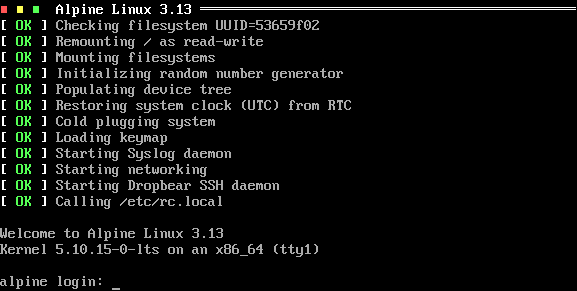Alpine Linux with Finit
Alpine Linux is an amazing little operating system. It’s small, boots quick, and easy to use. The size alone makes it very attractive to container builders.

Alpine Linux started with Finit
This blog post details how to set Alpine up with the Finit init system, replacing the default OpenRC.
Alpine SDK
After install you need to add some more packages to build Finit from source. The example given here builds from GIT sources, which require a few more steps. Building from release tarballs is easier and does not bring the same amount of overhead.
~$ apk add alpine-sdk autoconf automake libtool linux-headers
Finit Deps
Finit relies on two libraries that used to be built-in but now are their
own separate projects: [libite (-lite)][2] and [libuEv][3]. The former
contains basic frog DNA and the latter a small event loop that basically
is just a wrapper for Linux epoll() & C:o.
~$ git clone https://github.com/troglobit/libite
~$ git clone https://github.com/troglobit/libuev
~$ git clone https://github.com/troglobit/finit
Build each of the dependencies first:
~$ cd libite
~/libite(maaster)$ ./autogen && ./configure && make && sudo make install
...
~/libite(maaster)$ cd ../libuev
~/libuev(maaster)$ ./autogen && ./configure && make && sudo make install
...
Note: since Alpine Linux 3.15
doasreplaces sudo. See the following blog post for details, in shortalias sudo=doas: https://www.perrotta.dev/2022/02/doas-bridging-the-sudo-gap/
Finit
Now lets build Finit for Alpine!
~/libuev(maaster)$ cd ../finit
~/finit(maaster)$ ./autogen
~/finit(maaster)$ ./contrib/alpine/build.sh
...
*** Done
Time to wake up! We’re now at the critical part where we can potentially screw things up – the installation.
Please, read the output from the install script carefully!
~/finit(maaster)$ ./contrib/alpine/install.sh
The first question is easy, do you really want to install Finit? Yes.
For the second question, however, I recommend answering NO first and
manually set init= in the boot loader, just to make sure everything
works OK. You can re-run install.sh later to repeat the process.
*** Install Finit as the system default IOnit (y/N)? N
*** Done
Testing
Reboot your system and be quick to press the Tab key to enter the Alpine boot loader menu. Press Tab again to edit the kernel command line, we want to:
- Remove the ‘quiet’ option
- Append the ‘init=/sbin/finit’ option
The second of the two is the interesting part, that’s what tells the kernel to not use its built-in heuristics to select the first user space program to start, but instead start Finit. We remove the quiet option just to get some more debug info from the kernel and a boot progress from Finit itself.
Press Enter to boot.
If everything worked you should see the bootup and be presented with the login prompt, as shown below.
If you like the setup, you can go ahead and run the install script again and this time answer Yes to the last question.
Use the initctl companion tool to Finit to start/stop, activate and
reload new configurations.
Good luck and have fun! :)